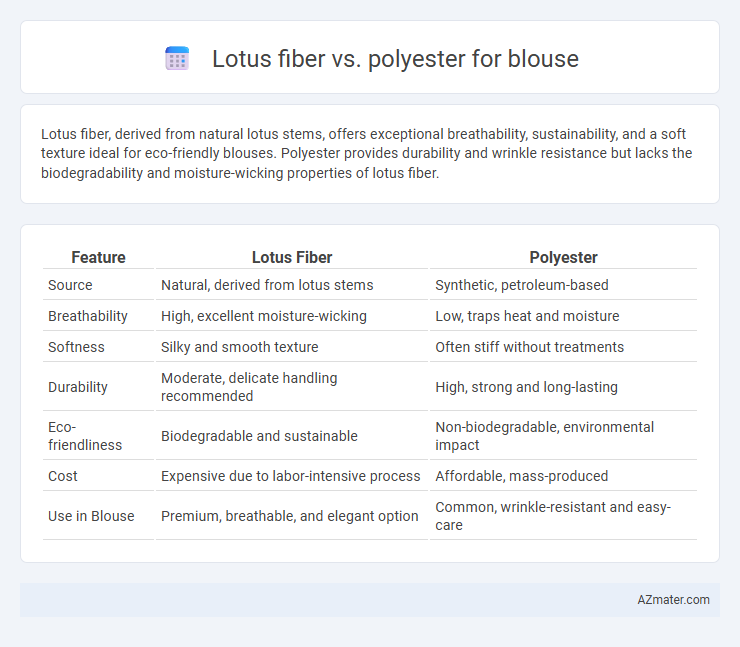Lotus fiber, derived from natural lotus stems, offers exceptional breathability, sustainability, and a soft texture ideal for eco-friendly blouses. Polyester provides durability and wrinkle resistance but lacks the biodegradability and moisture-wicking properties of lotus fiber.
Table of Comparison
| Feature | Lotus Fiber | Polyester |
|---|---|---|
| Source | Natural, derived from lotus stems | Synthetic, petroleum-based |
| Breathability | High, excellent moisture-wicking | Low, traps heat and moisture |
| Softness | Silky and smooth texture | Often stiff without treatments |
| Durability | Moderate, delicate handling recommended | High, strong and long-lasting |
| Eco-friendliness | Biodegradable and sustainable | Non-biodegradable, environmental impact |
| Cost | Expensive due to labor-intensive process | Affordable, mass-produced |
| Use in Blouse | Premium, breathable, and elegant option | Common, wrinkle-resistant and easy-care |
Introduction to Lotus Fiber and Polyester
Lotus fiber, derived from the stems of the lotus plant, is a rare and eco-friendly natural textile known for its lightweight, breathable, and moisture-wicking properties, making it ideal for high-end blouses. Polyester, a synthetic fiber produced from petroleum-based polymers, offers durability, wrinkle resistance, and cost-effectiveness commonly favored in mass-produced blouses. The contrast in origin, sustainability, and fabric characteristics significantly influences the choice between lotus fiber and polyester for blouse manufacturing.
Origin and Production Process
Lotus fiber is a natural textile derived from the stems of lotus plants, primarily harvested in Southeast Asia through a delicate hand-extraction process that involves boiling and drying the fibers, making it an eco-friendly and sustainable material. Polyester, a synthetic fiber, is produced from petrochemicals through a polymerization process that involves melting and extruding the materials into fine fibers, enabling mass production with lower costs but higher environmental impact. The origin of lotus fiber as a plant-based, biodegradable resource contrasts sharply with polyester's industrial, petroleum-based production, affecting the environmental footprint and breathability of blouses made from each fiber.
Environmental Impact and Sustainability
Lotus fiber, derived from the lotus plant's stems, offers a biodegradable and renewable alternative to synthetic polyester, which is petroleum-based and non-biodegradable. The cultivation of lotus plants requires minimal pesticides and water, supporting sustainable farming practices, whereas polyester production involves high energy consumption and significant carbon emissions. Choosing lotus fiber for blouses reduces environmental pollution and supports eco-friendly textile innovation, contrasting with the long-term ecological challenges posed by polyester waste.
Comfort and Breathability Comparison
Lotus fiber offers superior comfort and breathability compared to polyester, as its natural cellulose structure allows better air circulation and moisture absorption. Polyester, a synthetic fabric, tends to trap heat and moisture, making it less breathable and potentially uncomfortable in warm climates. The hypoallergenic and eco-friendly properties of lotus fiber further enhance wearer comfort, distinguishing it as an ideal choice for blouses in hot and humid conditions.
Durability and Longevity
Lotus fiber offers moderate durability with natural strength and resistance to wear, making it suitable for lightweight, breathable blouses that last through regular use. Polyester excels in longevity due to its synthetic composition, providing high resistance to stretching, shrinking, and abrasion, resulting in blouses that maintain shape and color over extended periods. Choosing between lotus fiber and polyester depends on the desired balance between natural fiber benefits and superior durability for long-lasting blouse performance.
Texture and Appearance
Lotus fiber offers a naturally smooth, matte texture with a subtle sheen that enhances the blouse's elegance, while polyester typically has a shinier, synthetic look that can appear less breathable. The fine, crisp feel of lotus fiber provides a unique softness and a lightweight drape, contrasting with polyester's often stiffer and less natural feel. Lotus fiber's natural irregularities add a handcrafted aesthetic, whereas polyester maintains uniformity but may lack the organic charm found in lotus fabric.
Care and Maintenance
Lotus fiber blouses require gentle hand washing with mild detergent to preserve their natural softness and delicate texture, avoiding harsh chemicals and excessive agitation that can cause fibers to break down. Polyester blouses offer easier care with machine washability, high durability, and resistance to shrinking and wrinkles, making them low-maintenance options for everyday wear. Both materials benefit from air drying, but polyester dries faster, while lotus fiber should be kept away from direct sunlight to prevent discoloration and preserve fabric integrity.
Cost and Accessibility
Lotus fiber blouse materials tend to be more expensive and less accessible due to labor-intensive harvesting and limited production regions, primarily in Southeast Asia. Polyester blouses offer a cost-effective alternative with widespread availability and mass production, making them more accessible globally. The higher price of lotus fiber reflects its eco-friendly, natural origin and unique texture compared to the synthetic nature of polyester.
Skin Sensitivity and Hypoallergenic Properties
Lotus fiber is naturally hypoallergenic and ideal for sensitive skin due to its breathability and moisture-wicking properties, reducing irritation and allergic reactions. In contrast, polyester, a synthetic fabric, tends to trap heat and moisture, which can exacerbate skin sensitivity and cause discomfort. Choosing lotus fiber for blouses ensures a gentle, skin-friendly fabric that minimizes allergic responses and promotes comfort throughout wear.
Which is Better for Blouses?
Lotus fiber stands out for blouses due to its exceptional breathability, eco-friendly production, and natural moisture-wicking properties, making it ideal for warm climates and sensitive skin. Polyester, while durable and wrinkle-resistant, tends to trap heat and lacks the natural softness and biodegradability of lotus fiber. For comfortable, sustainable, and breathable blouses, lotus fiber is the superior choice.

Infographic: Lotus fiber vs Polyester for Blouse
 azmater.com
azmater.com